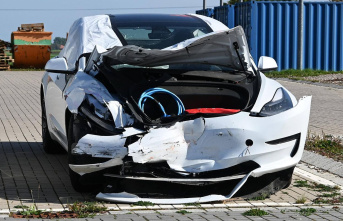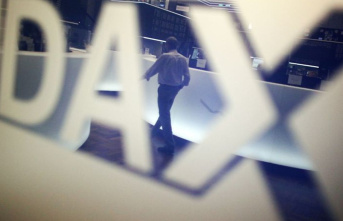Frankfurt's airport boss Stefan Schulte fought for this for many years, and it should now become reality at the turn of the year: The airport operator Fraport will be the first in Germany to take over the direction of passenger and hand luggage checks from the federal police.
Declared goals are faster and more effective processes at the unloved control lanes, shorter waiting times for passengers and ultimately greater reliability of the entire air traffic system.
Air passenger checks are often bottlenecks
Airlines and other airports are looking at the Frankfurt model with great interest, as the associations ADV and BDL assure. Because even in the comparatively low-traffic flight summer of 2022, the passenger checks organized by the Federal Police have proved to be bottlenecks, especially in Cologne, Düsseldorf and Berlin. Although the waiting times at Frankfurt Airport are usually reasonable, operations had to be artificially limited due to the shortage of ground handling service providers. In the interests of a stable flight schedule, Lufthansa was not able to grow as quickly as its competitors in Paris or London.
Even before Corona, Frankfurt and other German airports were lagging far behind when it came to the speed of controls compared to other European countries. With 80 passengers per hour, the outdated Frankfurt lines did not even manage half the throughput of passengers as was achieved in Amsterdam, for example. The costs ultimately to be financed by the passengers via a fee were correspondingly high.
competition between service providers
The work on the control lanes will continue to be carried out by private security service providers after the reorganization. The companies hope for a better organization of the processes and less loss of information, as the spokeswoman for the industry association BDLS, Silke Zöller, says. "Fraport is simply closer and can bundle the various information, for example from the flight plan, better." Fraport boss Schulte has already announced that he will fan the competition between the various service providers by tendering more lots than before. The Frankfurt-based company sold the majority of its own service provider Frasec to the Munich-based company Dr. Sasse AG sold in order to be able to operate more freely.
The Verdi union does not initially fear any increased pressure on the aviation security assistants with the new system. "Fraport has a great interest in the whole thing working for the time being," says Wolfgang Pieper, who coordinates the collective bargaining for the around 25,000 employees nationwide. After hourly wages of 20 euros were enforced across the board, more full-time contracts and binding bonuses are now on the union's agenda. The biggest problem for companies will continue to be finding enough workers for the job.
Fraport also ordered new technology faster than was possible via the Federal Procurement Office. In the first quarter of the year, seven innovative CT scanners are to be put into service, with which liquids and electronic devices no longer have to be taken out of hand luggage. So far, only products from the British conglomerate Smiths Detection with its Wiesbaden plant have been used. Now a control line of the competitor Vanderlande, which belongs to the Toyota group, is also being opened. Here, too, competition is intended to boost business, because with a total of 186 control lanes at Germany's largest airport, there is still a lot to do. And that's not even counting the new Terminal 3, which is scheduled to go online in 2026.
No sacrificing security
The devices, which have been tested since December 2020, screen hand luggage using computer tomography (CT) technology, which is known from medicine. Instead of just a few overhead images, they deliver hundreds of images of the piece of luggage without any loss of speed, which enables three-dimensional views on the control screen and the layer-by-layer x-raying of the bag's contents. The devices can also detect solid and liquid explosives. The restrictions on liquids in aviation were introduced in 2006 to counteract terrorism.
The declared goal of the Federal Police, which continues to monitor the entire control procedure, is that ultimately, despite all the profit-seeking, no compromises are made in terms of security. As the supreme aviation security authority, the Federal Ministry of the Interior and thus the Federal Police on site remain responsible for all aviation security-related issues. It lays down specific specifications for the type of control measures and the devices used. The staff of the commissioned security companies carry out the checks on behalf of Fraport, but continue to follow federal guidelines and under the supervision of the federal police.
Fraport is also only "encumbered" with the sovereign tasks, so in case of doubt the state can take over the organization again at any time. According to reports, the federal police at the airport will "gain" around 30 officers with the reform who were previously employed in the management of private service providers. The officers will be available for other police tasks in the future. Among other things, the authority is planning more covert test runs at the control points than before. The number of around 150,000 prohibited items found in 2021 already shows that the controls will continue to be important for aviation security. In addition, there were 17,000 hits on the manhunt and 1,500 executed arrest warrants.









